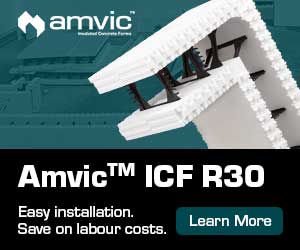
2024 Light Commercial Winner
& People’s Choice Winner
Alaska is a difficult environment for construction during the best of times. The Lake Clark Air Hangar & Terminal, in Anchorage, was completed in October 2021 after 68 weeks, accounting for significant Covid-related setbacks. “ICF boosted our time savings by 3 to 4 months, as well as allowed us to continue construction throughout the winter,” says Seth Kroenke of Remote Alaska Solutions, which was the project’s general contractor, ICF installer, and form distributor.
At 12,052 square feet, the Lake Clark project in Southwest Alaska combines a lobby for passengers for air service to the area, along with an airplane hangar, office space for employees, and comfortable resting areas for pilots. “This is an action-based building accommodating needs of regular passengers, tourists, employees, resting pilots, freight, aircraft, and aircraft maintenance,” explains Kroenke.
Several very different needs are seamlessly accommodated in the same building, including aircraft arriving to and from bush Alaska with passengers and all types of freight and hunting and fishing harvests. It’s also an aesthetically-pleasing and appropriate introduction of tourists to the Lake Clark region, which serves as the gateway to remote Lake Clark National Park.
Designing for the Environment
The lobby entry itself is reminiscent of walking under a canopy of trees, as if you were walking into a protected area in a forest, explains Kroenke. The deep canopy overhang protects passengers and their luggage from snow and rain while they are waiting outside to be picked up by ground transportation. The roof is designed to shed snow and rainwater away from any door openings or parts of the site that are used. The hangar portion of the building needed to be separated from the passenger/office side by a 2-hour fire barrier wall, which was easily accomplished by using ICFs. The openings between the two areas incorporate fire doors. The hangar needed to be an inviting, bright, clean space for the employees and any passengers that pass through it. “The ICF walls allowed easy installation of high-end, A-Grade plywood wall finishes; a feat that is more difficult in a typical pre-engineered metal hangar,” Kroenke says.
The strut-like architectural “foliage” of the canopy came from 150-year-old, sustainably-managed white pine from central Wisconsin’s Menominee Indian Reservation.
The lot occupied by Lake Clark Air at Merrill Field in Anchorage is narrow, and the hangar takes up most of the available width of the lot. Passenger aircraft are limited to the apron in front of the hangar to link the lobby space to aircraft parking. A canopy, similar to the entry, is routed along the east side of the building. This also allows passengers to exit the aircraft and go straight to the entry canopy without passing through the lobby space.
Sustainability & Significance
The thermal mass provided by the ICF walls allows for very quick heat recovery in the hangar, even with its 64-foot doors open. Concrete floors also help reduce thermal swings, absorbing heat from the south-facing windows during winter days and radiating it back later. The layout and south-facing glass windows screen the lobby from high angle summer sun to reduce solar heat gain, while at the same time allowing direct mid-winter sun into the space for daylighting and solar heating. Energy costs are further reduced through LED lighting systems.
This project provides a high-profile way for pilots and visitors to acquaint themselves with the advantages of ICF construction. Located along one of only a few major highways in the state of Alaska, Lake Clark Air’s location at Merrill Field showcased to the public not only the speed with which ICF buildings are constructed, but also that there are literally no limitations to their architectural style, size, or utility, explains Kroenke. “Perhaps most significantly, it reveals how commercial entities, particularly hangars, can visualize ICF’s significant long-term value, thermal prowess, built-in seismic resistance in an area known to receive high-magnitude earthquakes, and the ability to withstand natural disaster,” he says.
This building will have no problem supporting Anchorage’s large snow loads while resisting high seismic forces, he says. This is the third ICF hangar space for the owner since he learned about the tremendous benefits of this construction method. “This project has already served as a beacon for ICF construction throughout our region,” Kroenke says. “Lake Clark Air owners took great pride in welcoming newcomers to their grand opening event, with local media and the Chamber of Commerce involved in spreading the word about the new building. And in a place with such few degrees of separation as Alaska, word travels fast.”
Several years ago, Lake Clark Air owner Glen Alsworth watched in awe as Remote Alaska Solutions built a seven-hangar ICF building next door to his in Anchorage. He became enamored with the benefits of ICF construction and rented two of those seven spaces himself. When it came time to construct a new terminal and hangar for his company, he opted for the same type of construction and “wouldn’t have it any other way,” he said.
Project Statistics
Location: Anchorage, Alaska
Type: Commercial hangar
Size: 12,052 sq. ft.
ICF Use: 12,588 sq. ft.
Cost: $3.95 million
Total Construction: 68 weeks
ICF Installation Time: 50 days
Construction Team
Owner/Developer: Lake Clark Air
General Contractor: Remote Alaska Solutions
ICF Installer: Remote Alaska Solutions
Form Distributor: Alaska Concrete Solutions
Architect: Z Architects
Structural Engineering: Arete Structural Engineering
ICF System: Nudura
Fast Facts
- 80’x82’ hangar with attached 80’x42’ terminal
- 64’ custom hangar door.
- Strut-like “trees” evoke a natural canopy
- Steel trusses, 6” Insulfoam & EDPM roof
- 12” SIPs roof over timber framing
- Timber features all hand-hewn on-site
Like what you read?
Yearly Subscriptions Starting @ $30






































0 Comments